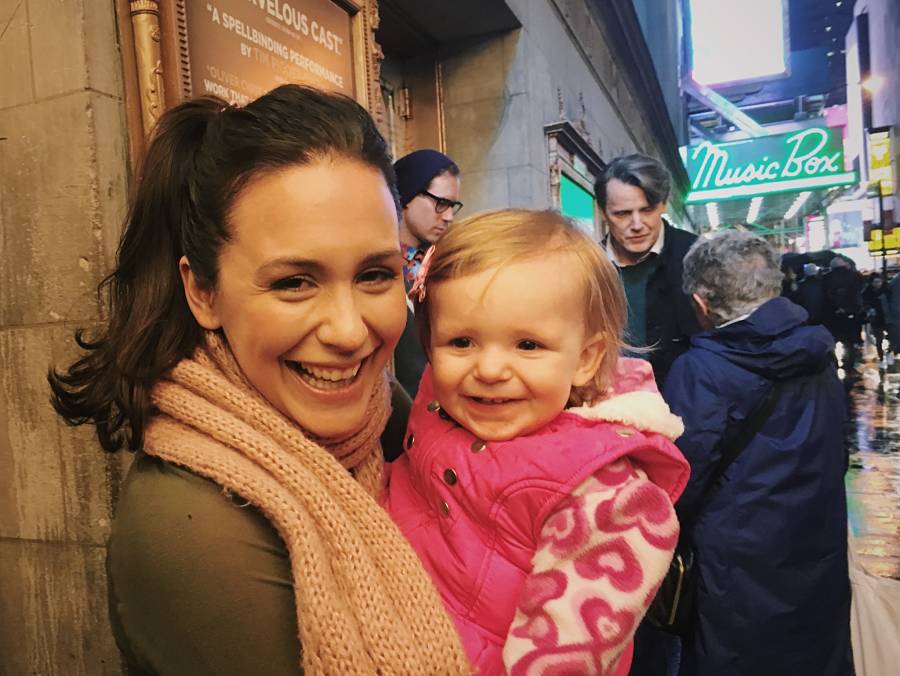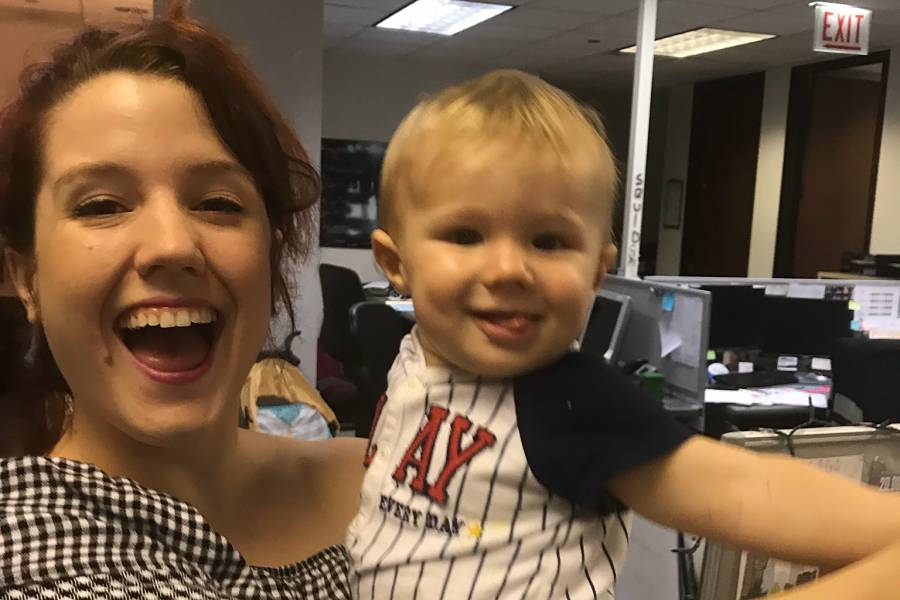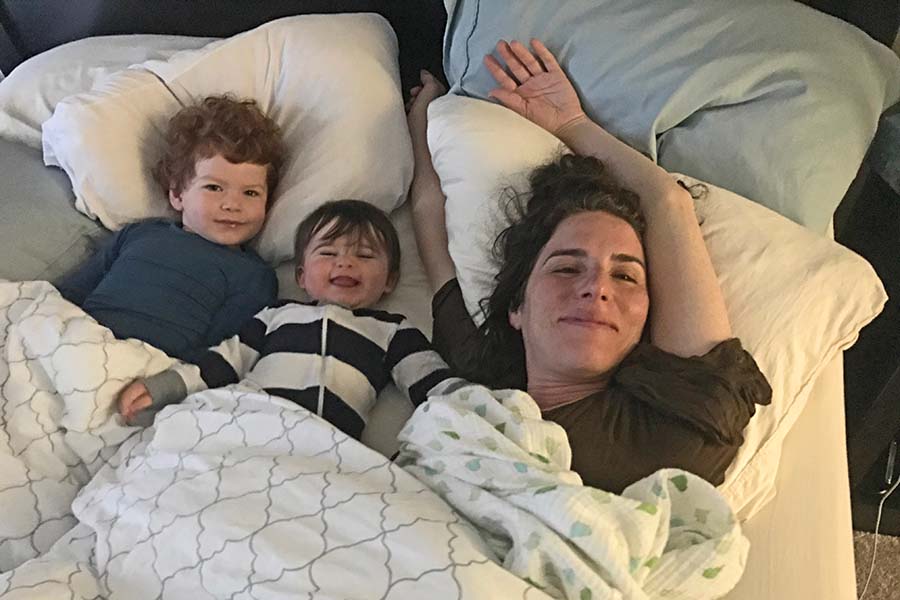It was January in Chicago, and my fingers were freeze pops. I was so sleep-deprived I forgot to wear gloves. My 3-month-old son was at home, weepy and adorable all at once. It was the end of my maternity leave, and this was one of the first times since his birth I was without him. He will be okay, I told myself. Think of all the happy, successful parents you know who spend time without their babies.
I was on my way to a panel at Shattered Globe Theatre. They were producing the Midwestern premiere of Rachel Bonds’s play Five Mile Lake, and hosted a breakfast meet-and-greet with Bonds. I was invited as a local playwright to speak on the panel, and since Bonds was also a new mom, I was excited to meet her.
When I arrived at the theatre, the first thing I saw was a mimosa bar. I wanted a mimosa but wasn’t sure I deserved a mimosa. Not sure if a mimosa was appropriate for a new mom, let alone a breastfeeder. I settled on coffee and sipped.
My eyes blurred. I was tired. Ears rang. Tired. Help me.
Finally I was introduced to Bonds. Her face was kind and we were quiet. I wondered if she was tired too. “I hear you have a young son,” I offered.
“I do,” she replied. “He’s about 15 months now.”
There was a polite pause. Then, just as I felt she was about to walk away, I blurted, “I have a 3-month-old!” and she abruptly stopped. She grabbed me, and her kind face turned to stone. She looked both sympathetic and concerned.
“You’re in the thick of it,” she said. Her voice seemed to come through a megaphone directly into my sleep-deprived soul. I felt like no one had actually spoken to me in months. Then she asked, “How are you doing?”
How was I doing? She was right: I was in the thick of it. I now know what she meant. Any parent knows what she meant. I was going on four months without sleep, continuing treatments for a bad birth injury, and bickering pointlessly with my fatigued actor husband, who was alternating between closing bar shifts and rehearsals.
The thick of it is thick, and my experience was no exception. As the single industrialized nation without paid parental leave, the United States is home to many thousands of struggling parents. Among these strugglers are theatre artists—people who would rather scramble every day than give up their passion.
New York City-based actor Kyra Miller is one of us scrambling folks. She starred as Rebecca in TheatreWorks Silicon Valley’s production of Rags in the spring of 2017. Miller brought a tiny baby across the country to do it. This sounded difficult, so I called her to see how it all went down.
“Well, first, I canceled my audition,” Miller admitted, laughing. “My toddler was sick, and then I lost my voice, and there were all these other disasters. The audition just couldn’t happen.” But just when Miller almost forgot about it, TheatreWorks reached out again and asked for a taped audition.
She took her time sending the tape, because she didn’t know if it was a serious ask. An experienced actor, she was used to disappointment, and it was a lot of hassle for a probable rejection. And if she did get the role, there would be an entire other series of logistics to hammer out. Where would the baby go? Would she want to be away from her toddler and husband for that long? The worries felt endless.
But Miller sent the tape. And she was offered the role.
There were competing factors to consider. She was in an acting drought and wanted to treat herself to a part she deserved. But it was a seven-week commitment, and she was breastfeeding, so the baby would have to come along. TheatreWorks offered Miller a studio to live in, but Miller wasn’t sure the small living quarters would suffice for her and the baby. What’s more, she would be away from her toddler and husband for a long time.
The Actors’ Equity contract offered a fixed weekly rate, but between the expenses of travel and childcare and infant living accommodations, Miller calculated that she would lose money. It would be a passion project—by thousands of dollars.
Miller turned the role down. She told TheatreWorks, “I’m so sorry, but I can’t subsidize this for my family right now.” I asked her how it felt. She said, “It was heartbreaking to get a job that good, at such a good theatre, and have to say no after such a long dry spell in my career.”
Then TheatreWorks came back with a counter-offer. “It turns out, when I declined the role, I was actually negotiating without realizing,” Miller said. The new offer included an extra $10 for every rehearsal hour to contribute to childcare costs. It also included an onsite caregiver room for the baby, a private office to nurse, and larger living quarters for the baby and family visits.
A woman on the theatre’s development team gave Miller a high chair, and another offered a crib, and the theatre purchased a car seat and a Pack ’n Play.
The village came through.
“I feel privileged to experience such kindness towards my family,” Miller said. “And in retrospect, it’s kinda funny, because baby-sitters in Silicon Valley are still way more than $10 dollars an hour. I don’t know what I would have done without that support.”
TheatreWorks artistic director Robert Kelley said that when Miller’s contract ended, the company placed the equipment in storage for the next caregiver to use. “I am hoping we will continue accumulating stuff,” he said. “And not just for actors, but any theatremaker involved with our company.” On the ever-changing nature of family needs, Kelley said, “My hope is that the closet will grow to accommodate families in any stage.”
The experience made Miller feel valuable, which can be rare for parent artists. “I find compensation in other ways than just monetary,” she said. “Like, one night when I was putting my daughter to bed, she said, ‘When you’re home, you’re Mama. But when you’re at the theatre, you’re Rebecca.’”

But not every theatre can be a family dream palace in Silicon Valley. As theatres across the country face financial crises, organizations have to be resourceful about what accommodations they can offer.
Over summer, I met the theatre and film actor Chiké Johnson. Since my husband is an actor—and the first among his group of male friends to have a child—I’m always curious to ask other artist fathers about their experiences. Like many working parents, Johnson’s journey has been both wonderful and not wonderful. Sometimes, he said, it is gloomy and difficult, but at all times it is worth it.
Johnson is the father of three children, and they’re not babies anymore. When his first two were little, the family resided in New York. Then the third arrived.
“It was rough with three kids,” Johnson said. “My wife [the actor Malkia Stampley] is way more talented than I am, and even she had trouble finding reliable work.” Many artists feel this pang of desire for some stability, but with every big break a countdown begins to the next pitfall. These things can strain relationships and make financial planning seem impossible.
As an arts family that kept growing, the Johnsons had a tough time settling down in one place, let alone New York. Johnson’s career demanded mobility, so he began to travel more. Acting took him to Milwaukee, Chicago, Phoenix, and more.
“When I’m gone, 80 to 90 percent of all the work of being a parent falls on Malkia,” he said. “And that makes me feel bad, so when I’m home I try to relieve her as much as I can.”
Then Johnson took a big breath. “It’s so hard not having them around me.”
Although his employers have made accommodations for his family, Johnson described a social and cultural punishment for having children. He said that landing television gigs would help his family play catch-up, but these would give them false hope before they fell behind again.
Despite all the hardships, he said, “It’s not a business for people to have kids, but look—we’re doing it. And my children are artists too. I’ve got a jazz guitarist, a theatre actor, a ballerina.”
To Johnson, one thing that makes it all worthwhile is the places his children have visited because of his acting jobs. They vacationed in Washington, D.C., spent two weeks visiting Chicago, and even went to see the Grand Canyon. “We were amazed by the size,” Johnson said. “It looks like a picture, and we never would have gone if it weren’t for my job in Arizona.”

As theatremakers who are parents, we do have resources, and our resources are growing. Now in its second year, PAAL, the Parent-Artist Advocacy League, seeks to bolster the rights of theatre professionals with families.
Rachel Spencer Hewitt, founder of PAAL and creator of AuditioningMom.com, came to the idea of PAAL when she started thinking about how motherhood and art inform one another. She had been writing about her experiences—working day jobs, juggling auditions, dealing with pregnancy—and eventually arrived at motherhood. She initially kept her writing private, because her pregnancy felt magical and personal. When her first child was born, she kept the news to a small group of people.
But one night at a party, someone made a comment that caused Hewitt break her silence. It was a grad school Christmas party, and by then people outside Hewitt’s chosen circle had heard about the baby. Hewitt was catching up with a male colleague who didn’t have children, and he asked how things were going since she became a mother.
“There was anticipation in the form of pity in his voice,” Hewitt recalled. She answered the question positively, saying she had found support, and discovered ways for motherhood and art to coexist, and that she was hopeful about where it could all lead. Her colleague was taken aback. He shut her off, saying, “That’s not everyone’s experience, so I wouldn’t share that.”
“I had spent my 20s feeling shut up as a woman in the theatre world, and in that moment, something about the command not to talk—about my child, about my happiness, about my goals and hopes and success—absolutely broke something in me.” Hewitt rebelled by redoubling her efforts to seek out other mothers in similar positions and form a community with them.
In her research she discovered Mothers Artists Makers Ireland and Parents in Performing Arts UK, both parent-artist advocacy groups. She also launched a blog series , “What She Looks Like,” about mother-artist experiences. “I wanted to publish everything from the good, the bad, the funny, to the ugly.”
After the blog was a success, a friend of Hewitt’s asked about starting a U.S. version of PIPA. Months later, PAAL was born with three tenets: Organize, Network, Create. It was a three-year plan that just completed year one, “Motherhood in Theatre: Breaking the Silence.” This year, the organization will focus on “Actionable Solutions, Initiatives, and Opportunities,” and next year, on “Parent-Friendly Policy and Protocol.”
Hewitt gave me some advice to share with parent artists who seek advocacy.
Find Your Allies and Organize. Connect with a community of other fellow parent artists. This not only increases community but increases the likelihood of sharing stories of similar experiences. Your needs are not indulgent or uncommon.
Know Your Rights. Look into the PAAL handbook and sites like the American Civil Liberties Union, which explain local and federal protections for parent employees. This will equip you with the appropriate language in negotiations.
Be Confident. Approach advocacy with benefit of the doubt. Many companies are still being educated on parent inclusion, so enter the conversation as a guide to what your needs—and the potential needs of your parent-colleagues—are.
Reach Out. If you feel penalized in any way by your familial status, you can reach out to PAAL directly and/or submit your experience to the PAAL discrimination survey, where stories of discrimination are collected safely and anonymously.
On the PAAL website, users can find more resources, including community events, research initiatives, childcare and networking opportunities, and sites for open spaces. There is also information about grants and opportunities funded by PAAL and elsewhere, such the Sustainable Arts Foundation, Brooklyn Art Exchange, Boulder Ensemble Theatre residency, and more.

Months after our exhausted run-in at the Shattered Globe panel, I spoke to Rachel Bonds again. I explained the lunacy I felt when she warned me I was in the thick of it, and she laughed. But then she said, “It took me about a year to feel like myself again. There were moments I thought, ‘Oh my God, I can’t be in this profession.”
While she was in the thick of it, she completed a six-week playwriting residency, while breastfeeding, across the country from her husband, with her mother there to support. When they arrived at the residency, there was an issue with the artist housing, so Bonds, her mother, and the baby stayed in a hotel for two days. Somewhere in the chaos, she misplaced the power cord to her breast pump. She would need to pump during rehearsal, so she spent the morning on a mad search for the piece.
When she finally arrived at rehearsal, she was in tears. “I missed the meet-and-greet and the entire design presentation for my own play, all because I was looking for a piece to a breast pump,” Bonds remembered. “I looked like a mess and completely unprofessional. It was crushing.”
I felt for her and thought of my own experience. For me, the familial nature of the industry has made maintaining my privacy difficult. I’m a playwright, so many people think they know me more intimately than they do—my inner thoughts come through the characters, or my own struggles become plot points. It can be hard to erase oneself from the work. Sometimes I’m in a rehearsal room as a dramaturg or script supervisor, and the close quarters and long hours can lead to a fast feeling of closeness. But that closeness sometimes becomes uncomfy.
I’m a young mom, and I look even younger than I am, so people often say, “You’re too young to be a mom,” and I have to explain. Or people ask, “Where would you like to pump?” before they even know if I’m breastfeeding. The answer is awkward, because I’m not breastfeeding. Because pumping was difficult, and keeping up my supply was difficult, and then I realize—wait, why should I have to explain all this to my colleagues?
The answer is: I don’t. I don’t have to. And no one has to.
The beauty and challenge of the work-life balance is just that: balance. Though theatremakers are passionate and close and in close quarters, it is still work. Now I am careful about the questions I ask other caregivers. I am careful about the questions I answer. I use moments as opportunities to teach, if I can. In the Five Mile Lake panel with Bonds, much of the conversation revolved around this very thing. As parent artists, how do we make it work? How does parenting affect our work? And what are the challenges we face?
I shouldn’t feel ashamed to say no to certain networking events. I shouldn’t be embarrassed to struggle with the cost of child care. And I definitely shouldn’t answer to the ways in which my son has been an obstacle in my career—because he hasn’t. He has only deepened the person I am.
Bonds is only a year ahead of me on this mother journey, but she inspires me. She’s like a window to the future. Soon, her son will turn 2 years old, on the very same day mine turns 1. Hewitt’s first step was to find allies, and I’m finding mine. In Bonds, in Miller, in Johnson, and in countless others who have showed up this year to support me.
Writing this now, it’s fall, and my son is playing at my feet. It’s sunny, and I feel blessed to be a mother who also writes. I’m not in the thick of it right now, but I will be again. And again. Because as he gets older and continues to change, there are many more thick-of-its to come.
Caroline Macon is a Tutterow Fellow at Chicago Dramatists and Lookingglass Theatre Company’s New Works Associate. Her essays, short stories, and reviews are at caromacon.com.


